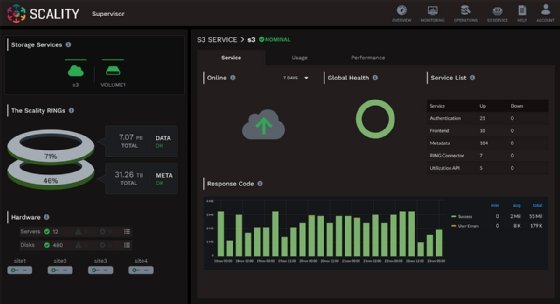
Getty Images/iStockphoto
Scality's Ring9 adds NVMe storage tier, new APIs
Scality Ring introduces its ninth major update, bringing an all-NVMe tier for better performance and new APIs for tighter integration to tools and third-party applications.
Scality's latest update to its object and file software adds automatic data tiering to shift cooler data to cheaper storage and provides access to Tier 0 storage for high performance workloads.
The tiering updates in Scality's ninth version of its Ring software are designed to address performance, capacity and cost issues companies are facing due to growing unstructured data volumes.
Enrico Signoretti, an analyst at GigaOm, described the update as "substantial," given that Ring9 can now tier data from an all-NVMe flash layer to spinning disks.
"This is particularly helpful both for ingesting data at higher rates and for high-demanding workloads that need NVMe flash for active data as well as high-capacity [slower media on the backend]," he said.
Ring9 also packages in the open-source event monitoring and alerting tool Prometheus and comes with new APIs for deeper relationships with partners VMware, AWS and Veeam.
More performance at the frontend
Scality added a highly performant all NVMe-SSD tier with three replications, increasing speeds and lowering latencies even when writing.
The update brings higher speeds without lowering capacity in large storage environments, according to Scott Sinclair, an analyst at Enterprise Strategy Group, a division of TechTarget.
"We've transitioned from just storing data, to now using data," Sinclair said.
Greg Tinker, senior vice president and CTO of automation and managed services at Anexient and Veristor -- a Scality systems integrator and customer -- said Ring9 addresses a performance issue Scality has faced for years. The software offers significant capacity with a single petabyte namespace as well as an ability to scale. But capacity of that size also strains performance.
All-flash environments provide the biggest boost in performance but are also costly for enterprise-size data sets, Tinker said.
"[Scality] needed a way to leverage a little bit of flash where appropriate and tier it down," Tinker said. Ring9 aims to do just that with its dynamic tiering, offering a feature uncommon in enterprise object storage.
According to Scality, customers decide on a percentage of Tier 0 storage and pay more for that capacity.

Additional updates
Ring9 also supports Prometheus, an event monitoring and alerting tool popular in DevOps for application performance visibility. Previously, Scality only provided access to a homegrown monitoring tool, Supervisor UI. But it wasn't user-friendly, according to Tinker.
Scality said customers can use Prometheus to build their own monitoring and alerting tooling.
"Customers are going to be more comfortable with Prometheus than a custom-developed tool by the vendor they can't modify," said Randy Kerns, an analyst at Evaluator Group.
Tinker also noted that Ring's UI was complex, requiring IT expertise to navigate -- another issue Scality addressed with Ring9. Now the software offers high-level overviews that show metrics such as how much capacity is free as well as when and where was data accessed.
Scality's Ring9 also includes tighter integrations with VMware vCloud Director (vCD), deployment and management software for virtual resources in multi-tenant cloud environments, and AWS identity and access management (IAM) compatible bucket policies for better security. Ring9 will provide day one support for new releases of Veeam in the coming year.
VMware vCD has an object storage extension that lets users monitor the Scality system from their UI. The upgrade to IAM policies gives customers tighter access control, according to the company.
Scality provides a blend between file- and object-based storage systems that can be useful to some use cases, such as DICOM images or telemetry, according to Kerns.
"Scality has the ability with Ring for its object storage nodes to have a scale-out file system on the same nodes," he said.
Ring competitors include Dell ECS, Dell ObjectScale, Cloudian, IBM Cloud Object Storage, and NetApp StorageGrid. But it's the only vendor to offer a scale-out file system implemented with the object storage on the same node, according to Kerns.
Adam Armstrong is a TechTarget Editorial news writer covering file and block storage hardware and private clouds. He previously worked at StorageReview.com.





